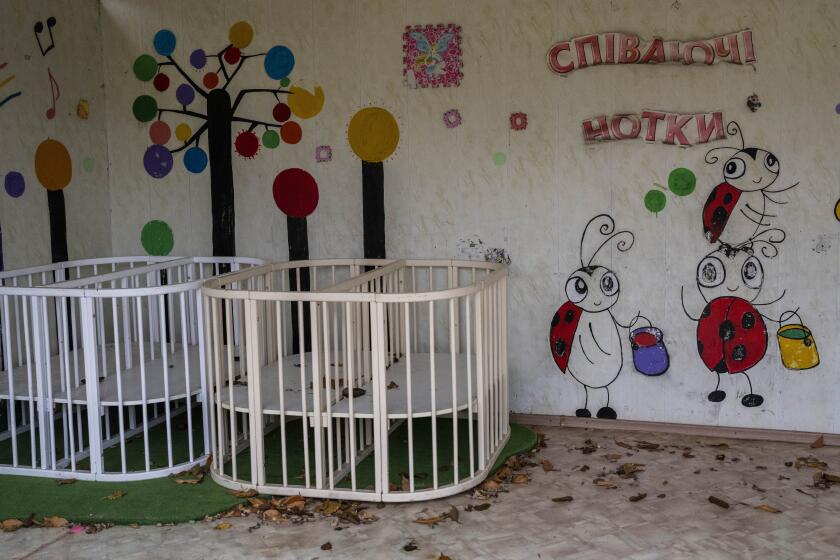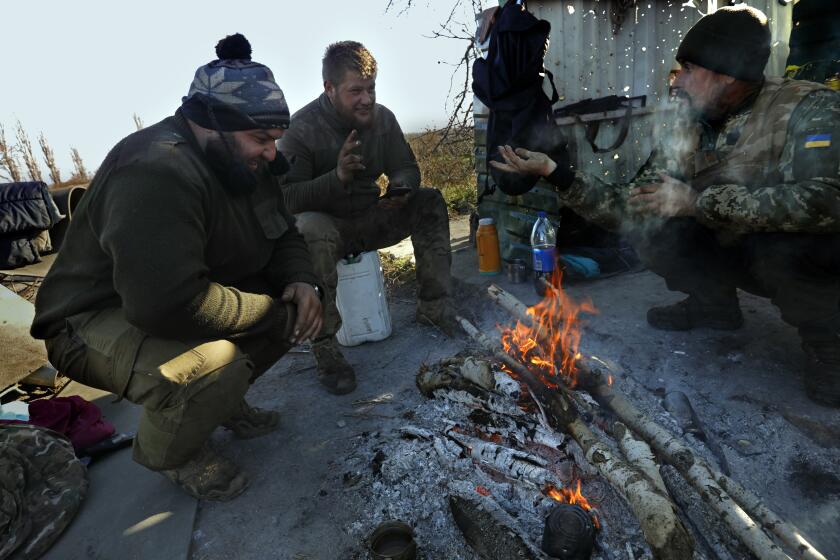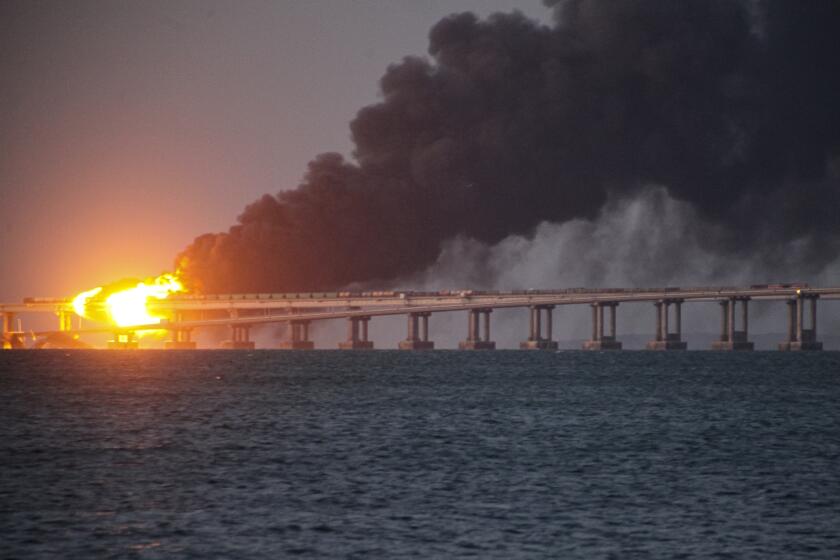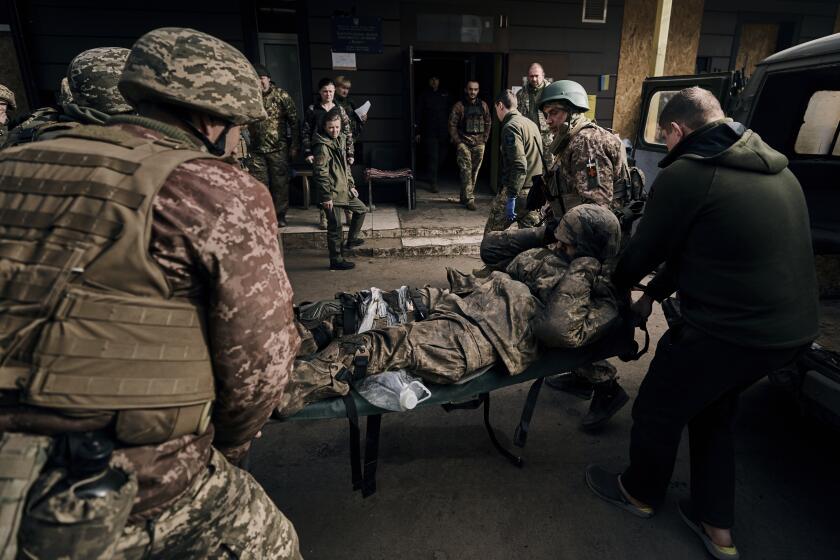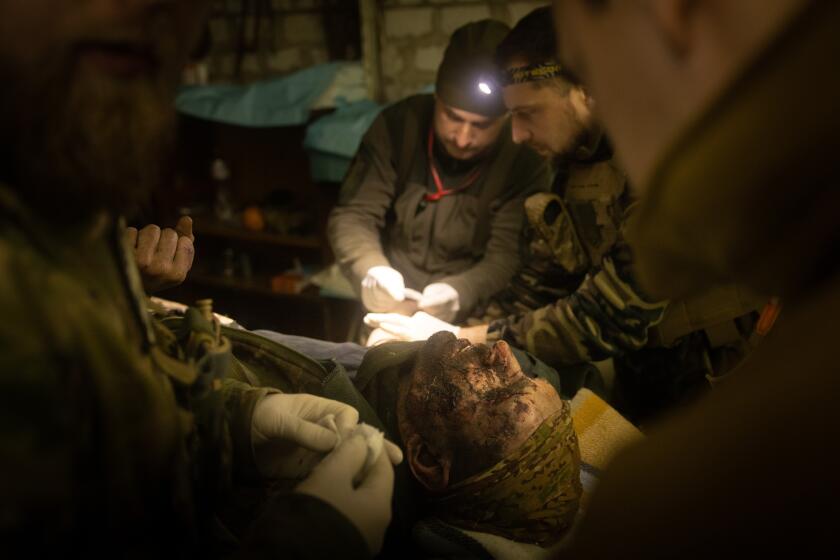Ukrainian drones strike 2 bases in Russia, Moscow says; Kremlin unleashes missile barrage
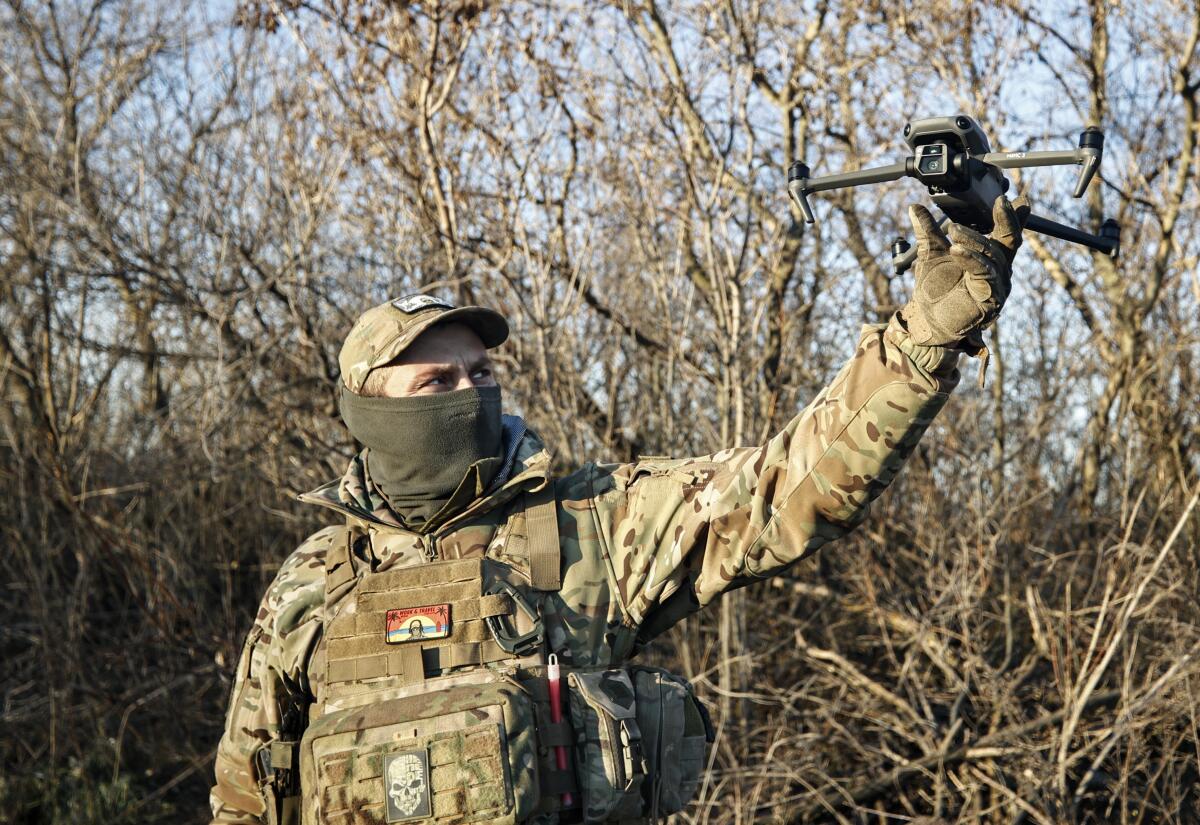
- Share via
KYIV, Ukraine — Ukrainian drones struck two air bases deep inside Russian territory, the Kremlin said Monday, shortly before Russian forces unleashed a massive missile barrage in Ukraine that struck homes and buildings and killed civilians.
The unprecedented attack in Russia threatened a major escalation of the nine-month war because it hit an airfield housing bombers capable of carrying nuclear weapons. President Vladimir Putin has threatened to use all available means to defend his land, a remark many have interpreted to include nuclear weapons.
Russia has been launching almost weekly bombardments of Ukraine in retaliation for another bold attack — the Oct. 8 truck bombing of a vital bridge linking its mainland to the Crimean peninsula.
On Monday, Putin tried to show his country could bounce back from that embarrassment by driving a car across the partially repaired bridge. Putin personally opened the 12-mile bridge in 2018 as part of an expensive effort to solidify his claim on Crimea, which Russia illegally annexed in 2014.
In Monday’s retaliatory barrage, missiles knocked out basic services in several Ukrainian regions in Moscow’s strategy to inflict more pain just as winter approaches. Ukrainian President Volodymyr Zelensky said four people were killed in Monday’s barrage.
Ukraine’s air force claimed it shot down more than 60 of the 70 missiles, and Zelensky again showed defiance, praising workers who immediately tried to restore power.
“Every downed Russian missile is concrete proof that terror can be defeated,” Zelensky said in his nightly address.
Throughout the war, Moscow has been accused of seizing and deporting Ukrainian children to Russia or Russian-held territories to be raised there.
Ukraine said early indications showed Russia fired 38 cruise missiles from carriers in the Caspian Sea and from the southern Rostov region. In addition, 22 Kalibr cruise missiles were fired from Russia’s Black Sea fleet, and long-range bombers, fighter jets and guided missiles were also involved, it said.
Electricity provider Ukrenergo said its facilities had been hit, triggering some blackouts, although the prime minister said later that power facilities were damaged in only three areas, not as widespread as in previous attacks.
In the capital, Kyiv, scores of people quickly congregated in the central Zoloti Vorota metro station after air raid warnings. There were no immediate signs whether the city or the surrounding region was hit.
In Ukraine, a bleak winter lies ahead for combatants and civilians alike, as its army strives to maintain battlefield momentum against Russian forces.
Ukrainian media reported explosions south of Kyiv, in Cherkasy, Kryvyi Rih and Odesa. Officials said water, electricity and central heating were cut to many parts of Odesa.
“The enemy is again attacking the territory of Ukraine with missiles!” Kyrylo Tymoshenko, the deputy head of the Ukrainian president’s office, wrote on Telegram.
Ukraine sees Crimea, the strategic peninsula illegally annexed by Russia nearly nine years ago, as potentially within its grasp.
In neighboring Moldova, the Interior Ministry said on its Facebook page that border patrol officers had found a rocket in an orchard near the northern city of Briceni, near Ukraine. A bomb squad went to the scene, but it was not immediately clear when the rocket fell or who fired it.
In detailing the attacks on the air bases, the Russian Defense Ministry said it had shot down two Ukrainian drones. It said three Russian servicemen were killed and four others wounded by debris, and that two aircraft were slightly damaged.
The attacks on the Engels base in the Saratov region on the Volga River and the Dyagilevo base in the Ryazan region in western Russia were part of Ukraine’s efforts to curtail Russia’s long-range bomber force, the ministry said.
The Engels base, more than 370 miles east of the border with Ukraine, houses the Tu-95 and Tu-160 nuclear-capable strategic bombers that have been involved in launching strikes on Ukraine. The Dyagilevo air base, which houses tanker aircraft used to refuel other planes in flight, is more than 300 miles northeast of the Ukrainian border.
Western demands that Russia withdraw from Ukraine as part of any future peace talks rule out such negotiations, Moscow says.
The attacks showed the vulnerability of some of Russia’s most strategic military sites, raising questions about the effectiveness of their air defenses if drones could come so close to them.
The ministry didn’t say where the drones had originated, but Russian military bloggers said they were probably launched by Ukrainian scouts.
Russian news agencies earlier had reported explosions at both sites, giving slightly different details than the Defense Ministry on casualties.
Ukraine’s armed forces published a photo purporting to show blood on snow under a military vehicle at one of the air bases. The authenticity of the photo could not be verified.
Avril Haines, U.S. director of national intelligence, says Russia’s war against Ukraine is running at a ‘reduced tempo.’
Zelensky’s advisor, Mykhailo Podolyak, trolled the Russians over the drone attack on Engels, stopping short of claiming responsibility.
“If something is launched into other countries’ airspace, sooner or later unknown flying objects will return to departure point,” Podolyak tweeted.
Breaking News
Get breaking news, investigations, analysis and more signature journalism from the Los Angeles Times in your inbox.
You may occasionally receive promotional content from the Los Angeles Times.
In other developemnts, Zelensky’s office said three rockets hit his hometown of Kryvyi Rih in south-central Ukraine, killing a factory worker and injuring three other people. In the northeastern region of Kharkiv, a person was killed in strikes by S-300 missiles on civilian infrastructure in the town of Kupiansk, it said.
The war that began with Russia’s invasion of Ukraine on Feb. 24 has displaced millions from their homes, killed and injured tens of thousands of people and shaken the world economy — driving up the price and curtailing the availability of food, fertilizer and fuel that are key exports from Ukraine and Russia.
Also Monday, Western countries began imposing a $60-per-barrel price cap and a ban on some types of Russian oil, part of new measures aimed at stepping up pressure against Moscow over the war.
The Kremlin rejected the move, and Zelensky has criticized it as insufficient.
Russian Deputy Prime Minister Alexander Novak, in charge of energy, warned Sunday that Russia won’t sell its oil to countries that try to apply the price cap.
“We will only sell oil and oil products to the countries that will work with us on market terms, even if we have to reduce output to some extent,” Novak said.
In another step that took effect Monday, the 27-country European Union imposed an embargo on Russian oil shipped by sea.
Russia, the world’s No. 2 oil producer, relies on oil and gas to underpin its economy, already under sweeping international sanctions.
More to Read
Sign up for Essential California
The most important California stories and recommendations in your inbox every morning.
You may occasionally receive promotional content from the Los Angeles Times.
